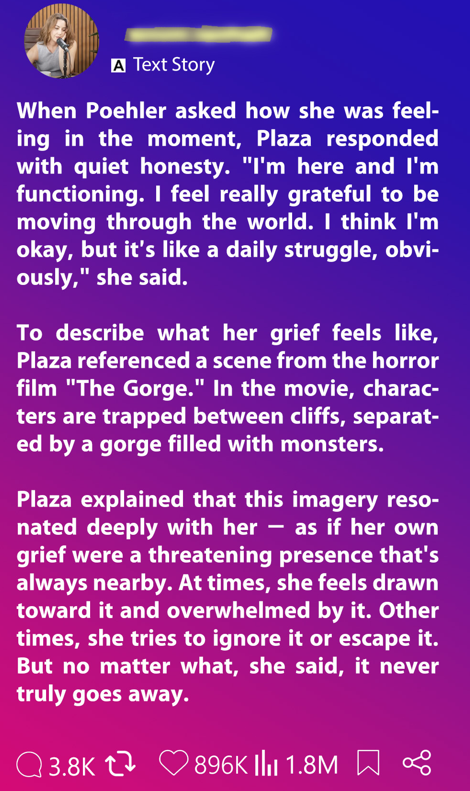In a recent episode of Amy Poehler’s podcast Good Hang, Aubrey Plaza sat down not as a comedian, not as a star, but as a widow—raw, vulnerable, and quietly shattered. Seven months after the tragic death of her husband, filmmaker Jeff Baena, Plaza opened up for the first time in detail about the grief that has reshaped her world.
Baena, known for his offbeat indie films and quiet brilliance, died by suicide in January at the age of 47. The loss was sudden, devastating, and deeply personal. Plaza, who had been with Baena for over a decade and married him in 2021, described the aftermath not in clinical terms, but through metaphor—one that stunned listeners with its emotional precision.
“Grief,” she said, “feels like the movie The Gorge.” In the film, two cliffs stand on either side of a pit filled with monsters. “That’s what it feels like,” Plaza explained. “There’s a giant ocean of awfulness right there. Sometimes I want to dive into it. Sometimes I just look at it. Sometimes I try to get away from it. But it’s always there. And the monster people are trying to get me.”
Her voice cracked. Her eyes, usually sharp with sarcasm, looked distant. Poehler, her longtime friend and Parks and Recreation co-star, gently asked, “How do you stay on the cliff and not fall into the gorge?”
Plaza paused. “I don’t know,” she said. “I think it’s my friends. My improv group. The people who remind me I’m still here.”
She admitted that laughter doesn’t come easily anymore. Comedy, once her armor, now feels foreign. “I don’t laugh at comedy much,” she said. “But I laugh with my dog. I laugh when I remember something stupid Jeff did.”
Throughout the hour-long conversation, Plaza oscillated between gratitude and grief. “I’m functioning,” she said. “I’m moving through the world. I feel grateful. But it’s a daily struggle, obviously.”
What made the episode so powerful wasn’t just Plaza’s honesty—it was her refusal to package grief into something palatable. She didn’t offer platitudes. She didn’t pretend to be healed. Instead, she gave listeners a glimpse into the quiet horror of loss, the kind that lingers in the corners of everyday life.
Fans flooded social media with praise for her analogy. “Aubrey gave a perfect analogy for grief,” one wrote. “Gratitude in the midst of grief is proof that love still breathes inside her.”
And that’s what Plaza showed us: that grief isn’t a wound that heals—it’s a landscape we learn to live beside. That even in the presence of monsters, there’s still a cliff to stand on. Still a voice to speak. Still a reason to laugh, even if only once in a while.


